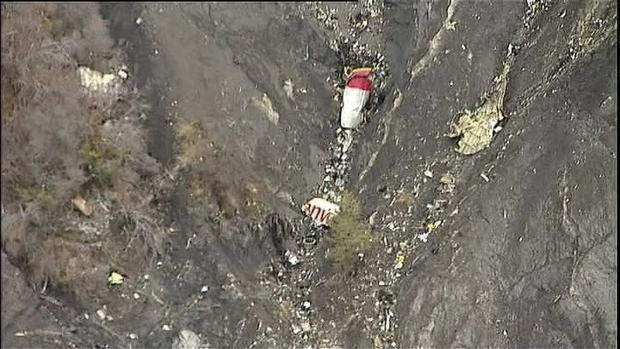Germanwings co-pilot no stranger to crash site area
SISTERON, France -- The German co-pilot accused of crashing a passenger plane in the French Alps frequented a gliding club near the crash site as a child with his parents, according to a member of the club.
Francis Kefer, a member of the club in the town of Sisteron, said on i-Tele television that Andreas Lubitz's family and other members of the gliding club in his hometown of Montabaur, Germany, came to the region regularly between 1996 and 2003.
French prosecutors say Lubitz deliberately slammed the Germanwings flight into a mountain on Tuesday, killing all 150 people aboard. German prosecutors are trying to determine what caused Lubitz to take such a devastating decision.
The crash site is about 30 miles away from the Aero-club de Sisteron glider airfield.
Officials at the club would not comment Saturday.
The area, with its numerous peaks and valleys and stunning panoramas, is popular with glider pilots. In the final moments of the Germanwings flight, Lubitz overflew the major turning points for gliders in the region, flying from one peak to another, according to local glider pilots.
A special Mass was being held Saturday in the nearby town of Digne-les-Bains to honor the victims and support their families.
Bishop Jean-Philippe Nault led the Mass, attended by about 200 people from the surrounding region, deeply shaken by the crash. It was the deadliest crash on French soil in decades.
The plane shattered into thousands of pieces, and police are toiling to retrieve the remains of the victims and the aircraft from a hard-to-reach Alpine valley near the village of Le Vernet.
Not a single intact body from the 150 souls on the doomed airliner has been found, CBS News correspondent Allen Pizzey reports.
Evidence and debris has to be taken by helicopter to an area where mobile labs have been set up, Pizzey reports. Technicians will have to use DNA to identify what is left of the victims. Dental analysis is also crucial. That includes a system of radiography, which allows them to take dental imprints, according to Col. Patrick Thuron of the French Gendarmerie.
"Normally 90 percent of victims are identified by their dental records," he said.
Lubitz's employers, authorities and acquaintances described a man who hid evidence of an illness from his employers - including a torn-up doctor's note that would have kept him off work the day authorities say he crashed Flight 9525.
Frank Woiton, another Germanwings pilot, said Andreas Lubitz told him he wanted to become a long-distance pilot and fly Airbus A380 or Boeing 747 planes.
Woiton, who like Lubitz comes from Montabaur, says he met the 27-year-old for the first time three weeks ago when they flew Duesseldorf to Vienna and back together.
Woiton told German public broadcaster WDR on Friday that Lubitz didn't stand out and appeared like any other colleague.
He says Lubitz "flew well and knew how to handle the plane."
Searches conducted at Lubitz's homes in Duesseldorf and in the town of Montabaur turned up documents pointing to "an existing illness and appropriate medical treatment," but no suicide note was found, said Ralf Herrenbrueck, of the Duesseldorf prosecutors' office.
Prosecutors didn't specify what illness Lubitz may have been suffering from, or say whether it was mental or physical. German media reported Friday that the 27-year-old had suffered from depression.
Germanwings declined Saturday to comment when asked whether the company was aware of any psychological problems Lubitz might have had.
The Duesseldorf University Hospital said Friday that Lubitz had been a patient there over the past two months and last went in for a "diagnostic evaluation" on March 10. It declined to provide details, citing medical confidentiality, but denied reports it had treated Lubitz for depression.
Neighbors described a man whose physical health was superb and road race records show Lubitz took part in several long-distance runs.
Prosecutors said there was no indication of any political or religious motivation for Lubitz's actions on the Barcelona-Duesseldorf flight.
